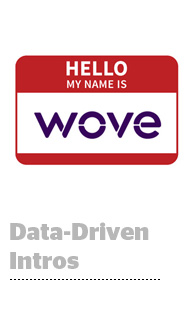
For the last year, the founders of Tapfwd have been pivoting their business from a mobile data marketplace to a matchmaking platform for marketers.
On Wednesday, the new company, which is called Wove, raised its $9 million Series A led by August Capital.
The transition from Tapfwd to Wove is more natural that it might sound initially.
In its first iteration, Tapfwd acted as a BlueKai of sorts for mobile data by mapping online and offline data to device IDs so that marketers could use it for targeting mobile campaigns.
But marketers have become increasingly disenchanted with third-party data.
“Our insight along the way was this: Why would a marketer want to lose control over their most valuable asset to an intermediary?” said Tapfwd-cum-Wove co-founder Alex Wasserman. “We’re trying to create a way for marketers to take advantage of their second-party data.”
The first partnership Tapfwd created linked two clients with similar customers before the Wove technology even existed. Wasserman and his co-founder Eddie Siegel, now CEO of Wove, introduced the two brands in a sushi restaurant over a meal. But sushi restaurant intros aren’t scalable.
Wove, whose clients include HotelTonight and wine membership company Winc, acts as a neutral party to facilitate partnerships between like-minded brands with similar audiences looking for co-marketing opportunities or the ability to target each other’s customers with ads for complementary products.
Brands sync their first-party data to the platform and Wove’s algorithm looks for demographic similarities in their customer bases to make recommendations on mutually beneficial partnerships. Wove also helps with campaign activation and measurement.
Imagine a dog-walking startup paired with a pet food brand – they both want to reach dog owners – or a yogurt brand paired with a healthy meal delivery service aimed at fitness-conscious suburban moms.
The marketer’s data is never comingled or used in any way that isn’t specified by the brands that upload it, Siegel said. If the purpose of the partnership is to let Company A target Company B’s customers on Facebook, for example, which is something Wove can help with, the targeting data is only available through Ad Manager during the life of the partnership, and neither company can download the individual data.
Other than Facebook and Google, marketers have precious few channels for new user acquisition at scale that don’t involve buying third-party data.
“That’s why they’re increasingly looking to collaborate with each other,” Wasserman said.
Wove will spend most of its funding on an engineer hiring spree. The plan is to up the company’s headcount from 19 to between 25-30 by the end of the year and invest heavily in building out the platform, tuning Wove’s algorithm and increasing its network of marketers. Siegel declined to disclose the number of brands Wove works with other than to say the platform has already reached “critical mass.”
This post was syndicated from Ad Exchanger.


More Stories
The ultimate Songs of the Summer list for NZ TikTok
Revolt Taps Freya Williams As Chief Strategy Officer for North America
KFC’s fish and chips brings Kiwis to the beach